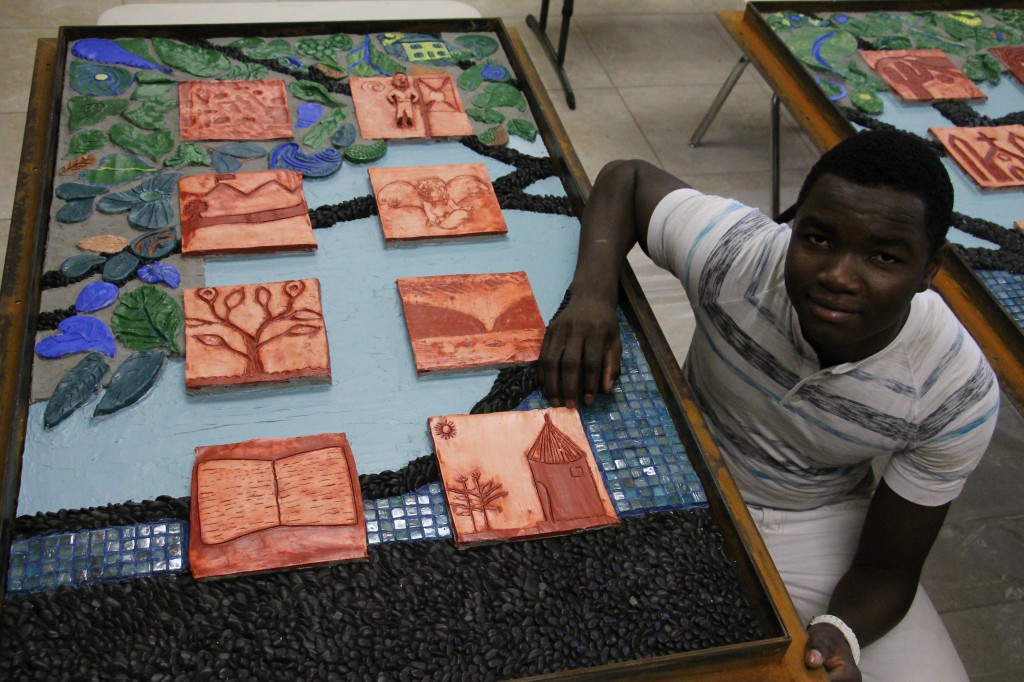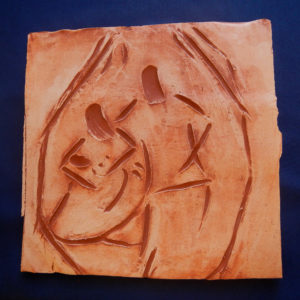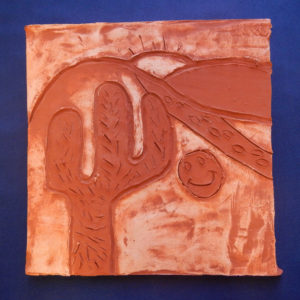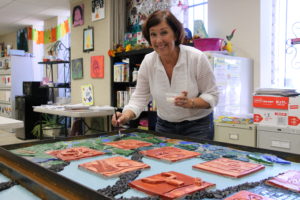
Every child deserves a safe place, whether it’s in a parent’s arms or a home. Children and young adults who are refugees don’t readily have such luxuries.
Feeling comfortable and welcome in a new land surrounded by a different language and vastly different culture can be overwhelming. That’s where Catholic Charities’ Unaccompanied Minor program steps in.
A network of staff, foster families and other volunteers help them settle into school and life in America via housing, counseling, case management and independent living skills. Its latest efforts to welcome young refugees have resulted in an artistic yet educational mural that depicts safe places 24 local refugees have found.

Some found a safe place in sports — American or one popular in their home country. Others depicted a new-found passion or shared a symbol of their faith, American foster family or their homeland. The main artists are largely older teenaged refugees who sculpted and stained a clay tile.
Each one neatly lines up underneath a large tree which represents the strong branches of community that supports them. Catholic Charities staff, foster families and other mentors created the leaves to symbolize the shelter they provide.
A “River of Light” flows through the bottom of the three-panel mural. Water is an element of healing in many of the 18 homelands from where recent refugees have come. It serves as a reminder that there is opportunity for healing and growth around each bend.
“A majority of our youth have been through very traumatic experiences and you would never know it. They’re completely resilient people,” said Aileen Moore, senior program manager.

One artist depicted the exterior of a church. It wasn’t her home parish, but the spot where she was re-united with her cousin as a young kid. A 16-year-old Iraqi refugee’s tile depicts a single set of footprints out of the mountains and into the Arizona desert — depicted by a cactus and a happy face.
“Some of their experiences represented here were not easy. It took a lot of bravery to not only come through it, but to share it,” said Elizabeth Noble, an artist in residence who mentored the youth on the project.
The minors participate in regular personal art projects — images of their home country, self-portraits, their path to America and mosaic initials — but the mural gave them a chance to express themselves for a larger audience. The mural’s Nov. 8 unveiling made it a permanent part of The Refuge, a café and wine bar whose proceeds support Catholic Charities’ Refugee Resettlement Program.
The “Safe Place” mural hangs outside The Refuge, which sits just south of Catholic Charities in Phoenix’s Melrose District. The young artists’ mindfulness and the textural quality they brought to their work impressed Noble, their art mentor. The project was a partnership with Free Arts of Arizona, which brings the healing powers of artistic expression to neglected and at-risk children.

“By making it something tangible, it shares the importance. It doesn’t get brushed under because it’s hard to talk about,” Noble said.
She hopes the mural helps the young refugee voices to be heard through the piece because it will validate their journey. She described one largely abstract tile made by a refugee from Bhutan. Turns out it depicts a wall behind his home in Bhutan. It was the only place he felt safe.
For Ishak, a 19-year-old refugee from South Sudan, his safe place was behind a hut in a garden.
“Whenever I feel there is depression around me, I stay in the garden for a couple of days,” Ishak said.
He came to the U.S. three years ago. He doesn’t have a garden in Phoenix yet, but Ishak is living on his own and dreams of graduating high school and studying business. He called the Catholic Charities office his safe place now.
[quote_box_left]
Unaccompanied Minor Program
The outreach of Catholic Charities Community Service is in its 30th year of helping foreign born youth start anew in the U.S.
To support its program as a foster parent or other means, call Diana at (602) 530-5518 or email dstickney@cc-az.org.
Catholic Charities is has an ongoing need for fostering American born children too. Call sally at (602) 943-3843 ext. 51910 or sgramke@cc-az.org.
[/quote_box_left]
Nancy Dang, a teacher in the Unaccompanied Minor program, said she was deeply moved by the depth and imagery expressed in the tiles. She even learned something new about some of the young artists she had known for awhile. Mini artist statements capture each one’s idea of a safe place.
“Every young person wants to be surrounded by adults that will love and protect them, to feel safe and to have hope for a future,” Dang said.
She hopes patrons who view the mural at The Refuge gain a better understanding of a refugee’s story and are encouraged to more actively support the unaccompanied minor program as a foster parent. Catholic Charities serves 75 youth through the Unaccompanied Minors in a given day.
Moore, who oversees the program, said their efforts are simply about encouragement and “making sure they have the support to grow into happy, fulfilled people.”







